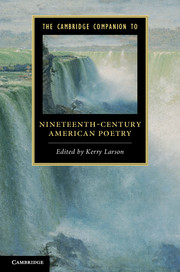Book contents
- Frontmatter
- Introduction
- I MANDATES, MOVEMENTS, AND MANIFESTOES
- II INDIVIDUAL AUTHORS
- 8 Longfellow’s ambivalence
- 9 Sarah Piatt’s grammar of convention and the conditions of authorship
- 10 Poe and Southern poetry
- 11 The color line: James Monroe Whitfield and Albery Allson Whitman
- 12 Colonial violence and poetic transcendence in Whitman’s “Song of Myself”
- 13 Emily Dickinson’s “turbaned seas”
- Selected guide to further reading
- Index
- Cambridge Companions to…
12 - Colonial violence and poetic transcendence in Whitman’s “Song of Myself”
from II - INDIVIDUAL AUTHORS
Published online by Cambridge University Press: 28 November 2011
- Frontmatter
- Introduction
- I MANDATES, MOVEMENTS, AND MANIFESTOES
- II INDIVIDUAL AUTHORS
- 8 Longfellow’s ambivalence
- 9 Sarah Piatt’s grammar of convention and the conditions of authorship
- 10 Poe and Southern poetry
- 11 The color line: James Monroe Whitfield and Albery Allson Whitman
- 12 Colonial violence and poetic transcendence in Whitman’s “Song of Myself”
- 13 Emily Dickinson’s “turbaned seas”
- Selected guide to further reading
- Index
- Cambridge Companions to…
Summary
This chapter originated as an inquiry into the site of enunciation of Whitman's “Song of Myself.” Throughout “Song of Myself,” the poet took up a trans-subjective stance that enabled him to straddle heterogeneous places and historical periods indifferent to the determinations of time and place. Was there a passage in the poem in which he acquired this freedom from the determinations of time and place?
My attempt to answer this question coincided with my effort to explain why Whitman had included the memory of the colonial violence that took place in Goliad within “Song of Myself.” Over time these seemingly incompatible processes of inquiry merged into the discovery that Whitman's poetic witness to the mass slaughter at Goliad located the otherwise unclaimable site of enunciation for “Song of Myself.”
This chapter constitutes an effort to find terms to explain the complicated relationship between the site of enunciation of Walt Whitman's “Song of Myself” and the colonial violence that this literary formation at once disavowed yet revealed. What Walter Mignolo has described as the “dark side” of the American Renaissance came to light in the antebellum United States when the rebirth of classical legacies within the so-called masterworks of the United States' literary tradition coincided with colonial expansion.
- Type
- Chapter
- Information
- The Cambridge Companion to Nineteenth-Century American Poetry , pp. 225 - 247Publisher: Cambridge University PressPrint publication year: 2011



